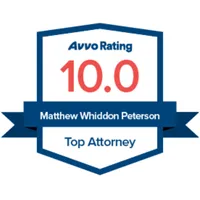Accused of White-Collar Crimes in Rockingham County? Our Defense Attorney Is Ready to Fight for You
At the Law Office of Matthew W. Peterson, we treat your case personally. As an aggressive and relentless Rockingham criminal defense attorney firm, we specialize in white collar crimes, steadfastly defending individuals charged with embezzlement, forgery, money laundering, bribery, and other related financial offenses. With seasoned trial lawyers and a former prosecutor on our team, we know exactly how the prosecution builds its case—and how to dismantle it.
What Is White-Collar Crime?
White-collar crime generally refers to non-violent, financially motivated offenses that often occur in business or professional settings. These cases are typically prosecuted under New Hampshire law in accordance with various chapters of RSA Title LXII – the state’s Criminal Code. Our firm defends a wide range of white-collar charges across Rockingham County, each involving allegations of financial wrongdoing or deception.
Common White‑Collar Charges We Defend
At the Law Office of Matthew W. Peterson, we handle a broad range of white-collar crime charges under New Hampshire law, including:
Embezzlement
Embezzlement (RSA 637:10) occurs when someone unlawfully takes money or property they were entrusted to manage, often in a business or financial setting. This can involve transferring company funds for personal use, altering records to conceal theft, or misusing client accounts. Depending on the amount involved, embezzlement can lead to felony charges, restitution, and long-term consequences for your career.
Forgery
Forgery (RSA 638:1) involves making, altering, or presenting false documents with the intent to deceive. This could include forging a check, signature, contract, or legal document to gain a financial advantage or mislead another party. In New Hampshire, forgery is taken seriously and is often prosecuted as a felony, especially if it results in financial loss to others.
Money Laundering
Money laundering (RSA 399-G:3) is the act of processing or moving money obtained from illegal activity in a way that makes it appear legitimate. This can involve transferring funds through multiple accounts, using shell businesses, or making structured deposits. These cases often arise from broader investigations and require a detailed understanding of financial systems and laws.
Bribery
Bribery (RSA 640:2) involves offering, giving, or receiving something of value in exchange for influence over a public official’s actions or decisions. This can happen in government contracts, licensing, or legal matters. Bribery charges can result in felony penalties and may permanently affect your ability to hold certain positions or licenses.
Tax Evasion
Tax evasion (RSA 641:7) occurs when a person or business deliberately avoids paying taxes they owe. This can include underreporting income, overstating deductions, hiding assets, or failing to file tax returns. Tax evasion can lead to criminal charges, audits, and penalties, and it’s often pursued aggressively by both state and federal authorities.
Occupational Fraud
Occupational fraud involves using one’s position in a company or organization to commit fraud or theft. Examples include submitting false expense reports, skimming cash, or manipulating accounting records. These charges can not only result in criminal penalties but also civil claims and permanent reputational harm.
Healthcare Fraud
Healthcare fraud includes any attempt to obtain payment or benefits from a healthcare program or insurer through deceptive means. Common examples include billing for services not provided, falsifying patient information, or engaging in prescription fraud. These cases may involve medical professionals, employees, or patients, and often require technical knowledge of billing systems and healthcare laws.
CyberCrime
Cybercrime (RSA 638:16–18) covers a wide range of illegal activities carried out using computers or networks. Charges can include unauthorized access to systems, online fraud schemes, phishing, or distributing malicious software. These cases often involve electronic evidence and require a legal team that understands how to examine and challenge digital investigations.
Insurance Fraud
Insurance fraud happens when someone intentionally provides false or misleading information to an insurance company to receive benefits they are not entitled to. This could involve staging an accident, inflating a claim, or submitting false documentation. Insurance fraud investigations often involve surveillance, audits, and interviews, so early legal guidance is critical.
Counterfeiting
Counterfeiting (RSA 638:5) involves the production or use of fake documents, goods, or currency with the intent to deceive others. This may include counterfeit money, forged licenses, or fake branded products. Being caught with counterfeit items—even without direct sales—can still lead to felony charges depending on the intent and scale of the offense.
Identity Theft
Identity theft (RSA 638:26) involves using someone else’s personal or financial information without permission, typically for financial gain. This might include opening bank accounts, taking out loans, or making purchases in another person’s name. In New Hampshire, identity theft is prosecuted under specific statutes and often involves complex evidence, including digital records and communications.
Why Choose Us as Your Rockingham County Criminal Defense Attorney
Choosing the right criminal defense attorney in Rockingham County can make a significant difference in how your case is resolved. At the Law Office of Matthew W. Peterson, we bring a strategic, informed, and aggressive approach to white-collar crime defense. Our deep knowledge of New Hampshire law and local court systems—paired with a commitment to understanding your personal and legal situation—helps us fight for the strongest possible outcome.
- Local insight, tenacious advocacy
Whether you’re from Brentwood, Candia, Derry, Hampton, Portsmouth, Salem, or elsewhere, our New Hampshire‑rooted legal team understands the local courts, the judges, and prosecution tendencies in
Rockingham County, NH. - Specializing in white‑collar crimes
White‑collar offenses are non‑violent but legally complex, involving deceit, financial manipulation, and trust violations under RSA Title LXII, Chapter 638. - Insider perspective
With a former prosecutor on staff, we anticipate how the state frames the case—from evidence to legal strategy—to provide a strong defense that preempts every prosecutorial move. - Highly aggressive defense
Our attorneys move fast: collecting records, reviewing bank statements, seizing every procedural misstep or constitutional violation, cross‑examining every witness, and exploring every defense—from lack of intent to mistaken identity.
Defending You at Every Turn
We approach every case with precision, urgency, and a strategy tailored to your unique situation. Here’s how we fight for your rights at every stage of the process:
- Thorough investigation
We subpoena financial statements, emails, contracts, and any records that show your side of the story. We work with forensic accountants and tech experts when needed. - Challenging the prosecution
If evidence was gathered unlawfully—through illegal searches, Miranda violations, or flawed chain-of-custody—we bring motions to suppress and dismiss. - Asserting powerful defenses
We stress lack of criminal intent, raise doubts on identity, and expose procedural errors. We challenge the narrative when prosecutors overstate evidence. - Pursuing a favorable resolution
When a trial isn’t beneficial, we leverage our negotiating skills to explore plea options, alternative sentences, or diversion needs that minimize collateral consequences. - Litigious readiness
If a plea deal is off the table or unfair, our experienced trial lawyers are ready to charge into court—cross-examination sharpened, motions prepped, strategy planned.
Personalized Strategy for Rockingham County Cases
In every case, we tailor our approach. A forgery allegation in Brentwood demands different sourcing than a money-laundering investigation in Salem. That means focusing on the specific statutes: RSA 638:1 for forgery, RSA 638:11 for misapplication of property, or RSA 638:7 for commercial bribery.
We understand how Rockingham County prosecutors present these cases and when the evidence is shaky, we make them prove every element under New Hampshire law.
The Value of Experience and Insight
What sets the Law Office of Matthew W. Peterson apart is not just our aggressive courtroom advocacy but our understanding of how prosecutors build white-collar cases. With a former prosecutor on our team, we are able to anticipate the government’s strategy and counter it effectively.
We combine that insider knowledge with real-world trial experience to offer clients a well-rounded and effective defense.
Contact Us Now to Set Up a Strategy Session
Don’t wait until charges are filed. White‑collar investigations can unfold quietly through subpoenas, interviews, and audits. The sooner we get involved, the better we can protect your rights and reputation. The Law Office of Matthew W. Peterson is ready to go to work for you—from Derry to Hampton, Portsmouth to Salem. We’re not just reactive: we’re proactive, strategic, and aggressive.
Contact us now to set up a strategy session with our Rockingham County criminal defense team. Let’s build a defense that shows the system you’re not an easy target.
Frequently Asked Questions
What qualifies as a white‑collar crime in New Hampshire?
Non‑violent, financially motivated wrongdoing—such as embezzlement, forgery, money laundering, bribery, fraud, identity theft—is typically charged under RSA Title LXII Chapter 638.
Can forgery be a felony?
Yes—if it involves official instruments like government documents, bonds, or checks. That’s a Class B felony. Lesser forgery may be a misdemeanor.
What penalties can I face for money laundering?
Penalties vary based on the amount and complexity, ranging from fines to lengthy prison terms. Coming under Chapter 638, severity depends on scheme size and evidence strength.
Is intent always required?
Yes. Prosecutors must prove that you intended to deceive or defraud. Without intent, we can attack a fundamental element of their case.
Should I speak to investigators?
Absolutely not—without counsel present. Statements made before legal guidance can unintentionally box you in. Instead, contact us now to set up a strategy session before taking any action.



